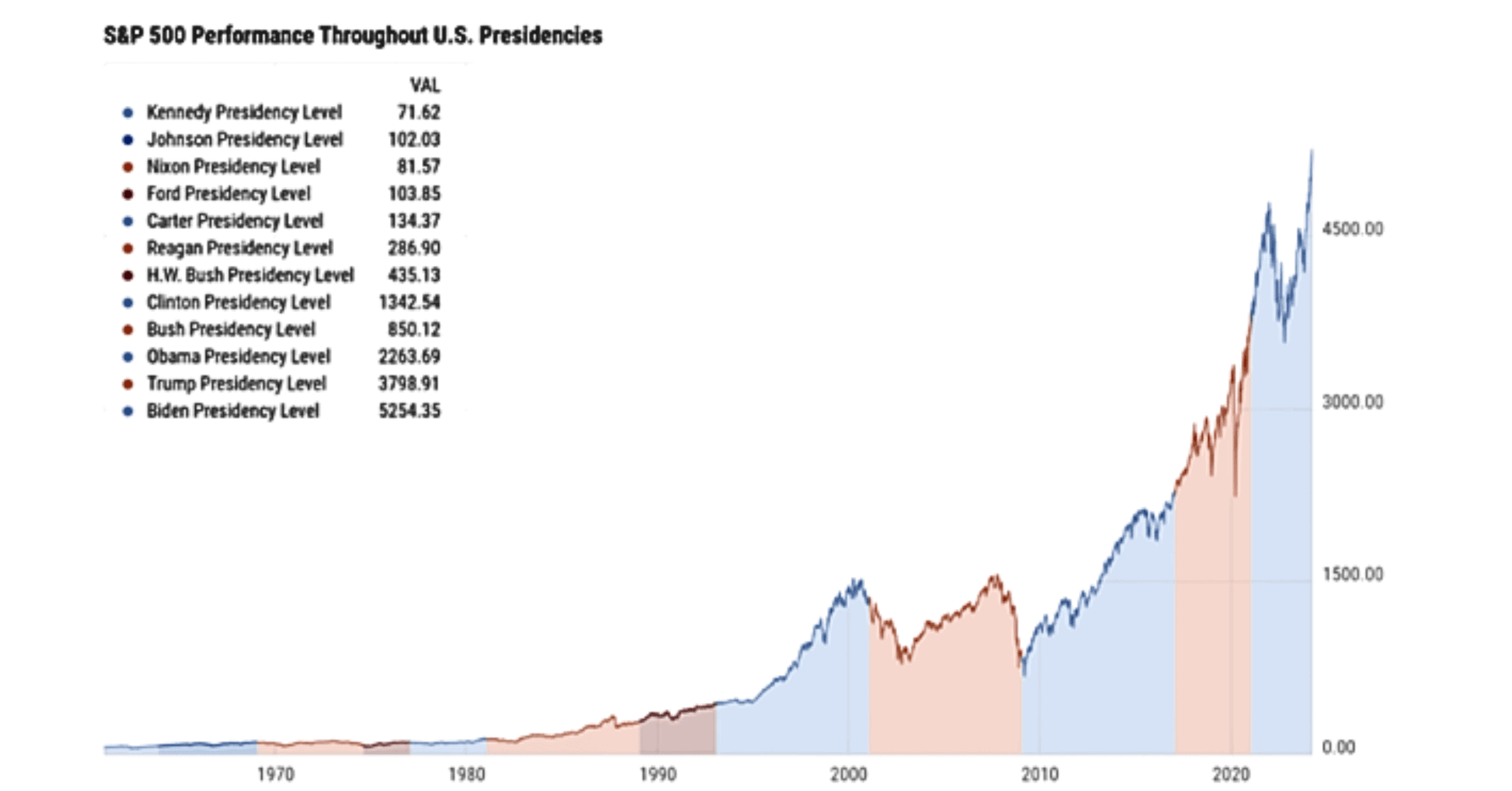Please provide your information and submit this form. Our team will be in touch with you shortly.

We might as well state the historical facts right up front: the financial markets are not affiliated with either the GOP or the Democratic Party. In fact, over the past ninety years, the stock markets have trended steadily upward—with intermittent drops in pricing—during both Republican and Democrat administrations. Take a look at the following chart, which illustrates the trend of the markets under various administrations, going back to JFK, in the early 1960s:

SOURCE: Y Charts. S&P 500, 1/20/1961 – 3/28/2024.
As you can readily see, the S&P 500 has had its ups and downs, under both Republican and Democrat presidents. And yet, the clear overall trend is upward. In fact, the longest bull market in history (so far) began under President Obama and continued under President Trump, until it was interrupted by the COVID-19 pandemic. The upward trajectory then resumed and continued higher under President Biden until about 2022, when spiking inflation depressed equity prices. Then, in 2023, the upward march continued, and as this is written the Dow and S&P 500 are both at or near all-time highs.
It may also help to keep in mind that the president, whoever he or she is, does not singlehandedly control the economy, taxation, or other important matters that can have a direct effect on your portfolio. The fact is, equity markets are supremely complicated and affected by a myriad of factors, with the occupant of the White House being only a single data point—and one that is not strongly correlated historically with stock market performance. Wars and international tensions, inflation and other economic matters, actions by Congress, natural disasters, and dozens of other things can exert upward or downward pressure on market pricing.
Are you curious about which presidents’ terms have been marked by the highest market returns? The record-holder is Bill Clinton (D-1993–2001), who saw a +209.8% rise in the S&P 500 during his presidency. The runner-up is Barack Obama (D-2009–17), with a 181.1% return. Next is Ronald Reagan (R-1981–89), at 117.9%. Only three presidents since 1929 have seen negative stock market returns during their terms: Herbert Hoover (R-1929–33, -77.1%), Richard Nixon (R-1969–74, -19.8%), and George W. Bush (2001–09, -36.7%).
Naturally, it is just as impossible to predict how the markets will do if this or that candidate is elected as it is any other time. There are simply too many unknown variables that can cause market pricing to move in either direction, and none of us have a crystal ball (at least, one that works reliably). Of course, we are all faced daily by an onslaught of news headlines suggesting this or that outcome that “could” occur if a particular candidate wins and is successful in enacting some piece of legislation. But speculating on the financial markets’ responses to any particular event is generally not the most advantageous method for reaching your important long-term financial goals.
So, maybe the best approach for most investors—not only in an election year but all the time—is to remember to focus on what you can control. Once you’ve exercised your right to vote for the candidate of your choice, you have no further control over the outcome of this or any other election. You have only limited control over the policies or laws that will be supported or enacted by your public officials. You have no control whatsoever over the daily price movements of the financial markets.
But you do have control over several very important factors. You can control the amount of diversification in your portfolio, which is the best protection against market volatility. You can control the rebalancing among asset classes in your portfolio, to ensure that your investments remain in the correct proportions that match your risk tolerance. And you can control your commitment to a long-term financial and investment strategy that is geared to your specific goals and stage in life. You can also control your reaction to news headlines, the claims and counterclaims of competing politicians, and predictions that may or may not come to pass.
History and financial research tell us that investors who remain patient, well diversified, and committed to a long-term strategy will do well over time, in most circumstances. Those same characteristics hold true during election years. In this connection, it’s probably worth watching (or re-watching, if you’ve already seen it) this video produced by our friends at Dimensional Fund Investors, “What History Tells Us about Elections and the Markets.” As the presentation points out, capturing the long-term returns available in the markets is not dependent upon which party controls the White House.
During uncertain times, it is also immensely helpful to have the guidance of a professional, fiduciary financial advisor. At Aspen Wealth Management, we provide reliable, evidence-based advice to our clients that helps keep them on track for reaching their most important financial goals. If you’re questioning what the future might hold for your investments, why not get in touch with us? We’re here to answer your questions and help you find the solutions you need.